Kuqe peaked during the Tang dynasty with that unbeatable combination of Buddhist scholarship and perfumed ladies, so not surprisingly yet another must-see for Silk Road caravans headed away from civilization to who knows where. Well that was then; as for now, we’re in the middle of a sandstorm when the K9720 overnight from Kashgar pulls in, and it’s going rapidly downhill from there.
No less than three different SWAT teams have excavated ‘What is your itinerary?’ from the depths of their Chinese GT and one has even insisted I perch inside their fetid bunkhouse while they commune with higher powers as to my fate, which finally involves an armed escort to the Kuche Grand Hotel in the police van and intense scrutiny as I check in.
The considerable disagreement on the Internet as to whether the Kuche Hotel is legitimately ‘Grand’ is easily resolved on inspection. The building presenting itself to the road is indeed a bona-fide 5 star, but the ramshackle assortment round the back (where the Internet usually ends up) are barely holding onto 2 and certainly the freezing and filthy room 316 deserves none, especially since the plumber who just came to reinstate the sink has left his debris all over the floor.
The view from vile room 316 in the sandstorm, enough said.
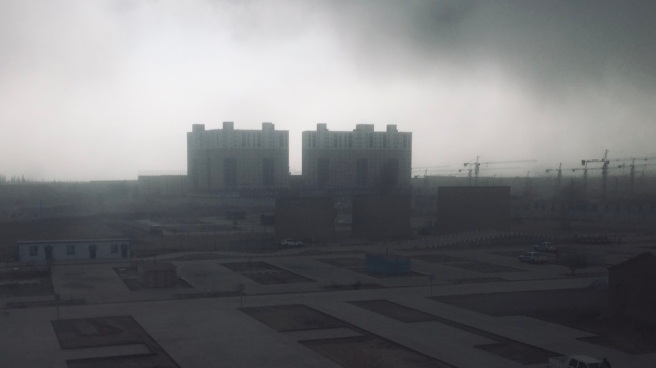
This in fact says it all
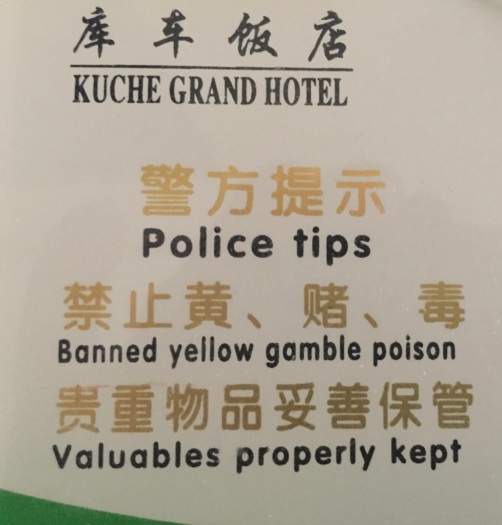
To be fair the 5 star (where we eat) has a killer breakfast replete with unusual quantities of recognizable, if not identifiable, vegetables, for a change
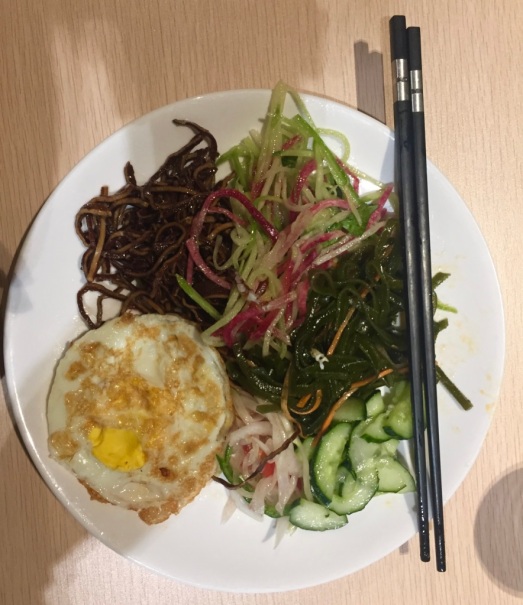
I’m just completing my catalog of complaints when yet another SWAT team shows up this time featuring the Kuqe Director of Immigration. The good news, that he at least can converse in English, is somewhat obscured by whatever he has spent the early morning drinking. I’ve had enough ‘It’s OK!’ I tell him cheerily ‘I’m not immigrating, I’m on vacation!!’ and close the door firmly.
Kuqe: A tragicomedy in three acts
Recall that all conversation is through GT
Prologue: I have just returned from the 5-star tourist office, where Dragon-lady has offered me a driver who demands twice the going rate for half the usual number of sites, to confer with the NYL at the desk who so obligingly moved me into desirable Building 9 where the rooms are undergoing haphazard renovation and mine has been more or less completed.
Me: That was a very expensive price can you help?
We both become aware of a spectral presence in our peripheral vision.
SP: I can do it for 350Y
Methinks: Fantastic! (350 Y is my aspirational price) but why is he is proposing it as a first offer? Dragon Lady must have been worse than I thought.
Me (aside to NYL): Is this a good man?
NYL in highly ostentatious spoken GT: ‘You can rest assured of that!!!’
Me: So, I want to go to the Subashi village and the Kizil caves tomorrow, is that OK?
SP: Yes that is OK
Me: What time and what is your name?
SP: I will meet you here at 10am. My name is Akbar. (charming self-deprecating smile) I used to study English in university, but I’ve forgotten so much!
Me: Well we’ll practice tomorrow Akbar! See you then!
Act 1: My surprisingly assiduous guide.
About 30 minutes later I emerge from Building 9. But here is Akbar, and he has brought a friend.
A: Where are you going?
Me: I’m going to the Uighur quarter, it’s to the left isn’t it?
A: Yes. I can take you.
Me: That’s OK, I want to walk.
A: You want to walk alone?
Me: Yes. See you tomorrow!
LP tells me the walk will take 40 min. It is along an extensive and incredibly ugly wall framed in razor wire and plastered with ghoulish inspirational posters. Every 100 meters the police checkpoints generate an ‘Oi!’ followed by a frenzy of passport checking and photographs. Eventually one fixates on my Cambodian visa and hauls me off up the food chain. A beat-up grey car appears in my peripheral vision, waves him off and somehow I am free to go, but I am dispirited. Maybe a cab there? I move over to the curb. The car glides in.
A: Would you like a ride?
Methinks: What just happened? But why not, save the cab fair?
Me: OK Akbar thanks! Akbar are you keeping an eye on me?
A: No (but he blushes up to his ears).
Methinks: Nice young man
The Uighur quarter mosque was rebuilt after earthquake damage, but may not survive this round of official neglect
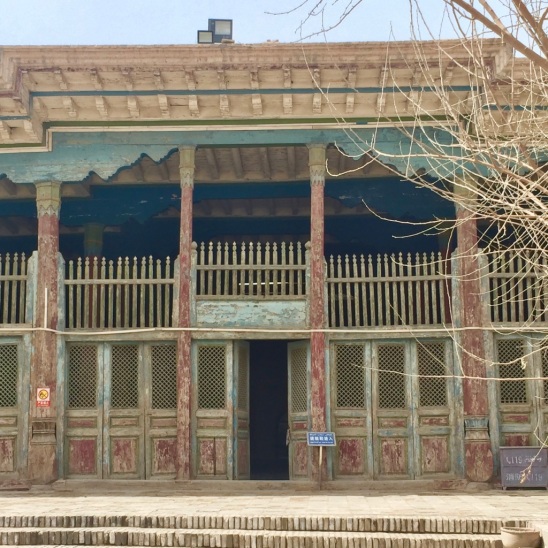
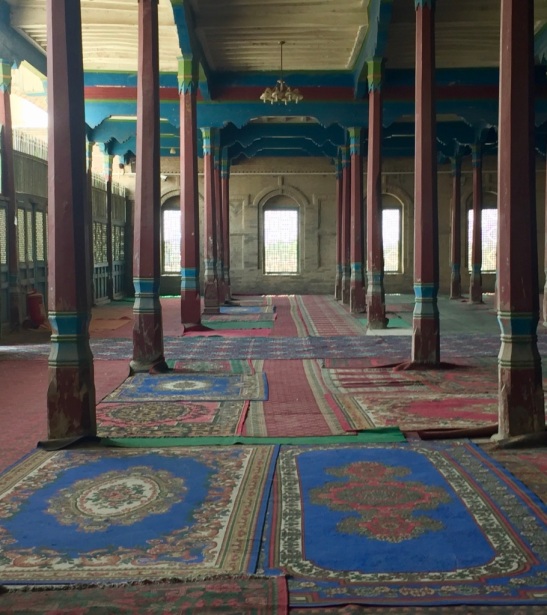
A: Want to have lunch?
Methinks: How sweet and why not, they’ll take me to a better place than I could find myself.
Delicious $1 kebabs (I pay)
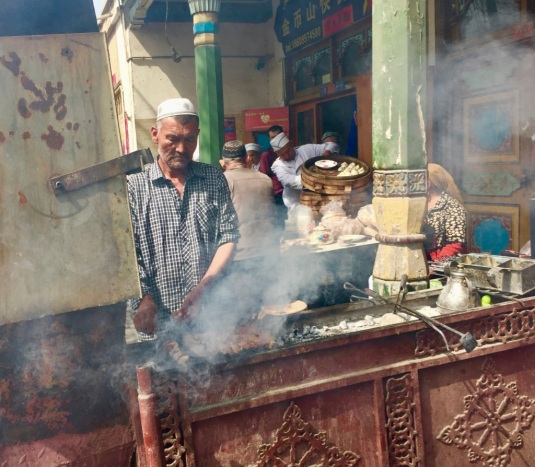
A: Now we’ll go to the palace
I really don’t want to go to the palace, an ugly Chinese reconstruction but somehow I find myself persuaded.
A nice example of the quality of the palace artifacts
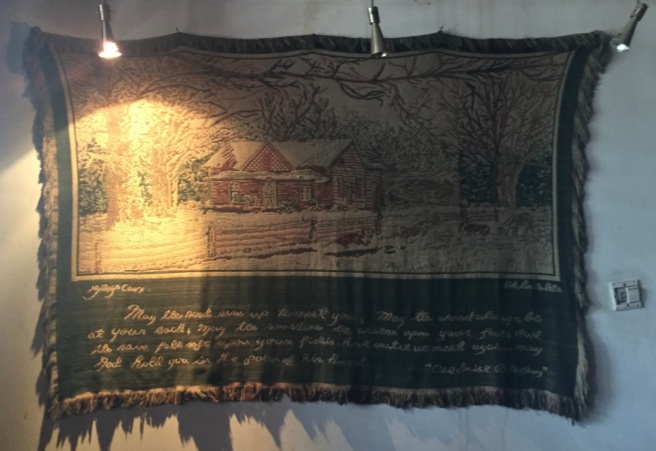
Inside there is only one other visitor – a random milenial who looks just like the pseudo-tourists in Kashgar – precisely the last person who would voluntarily pay $8 to admire ersatz history, in fact he’s paying more attention to me. I fake him out handily and disappear into the bazaar. Unfortunately in the middle of the afternoon it is deserted and provides little cover.
Scenes from village life, when its mostly absent
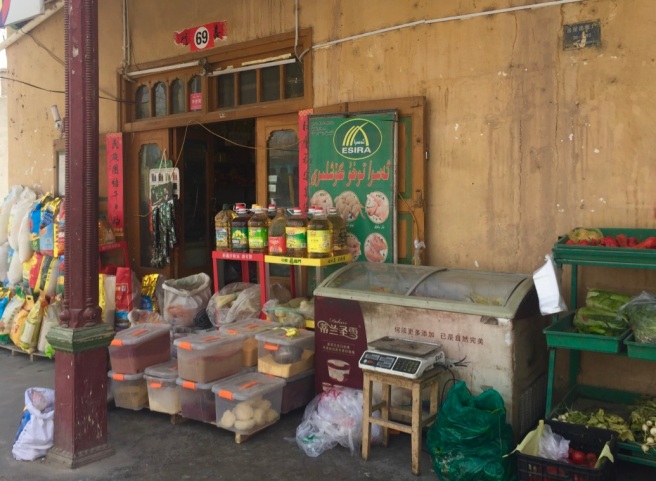
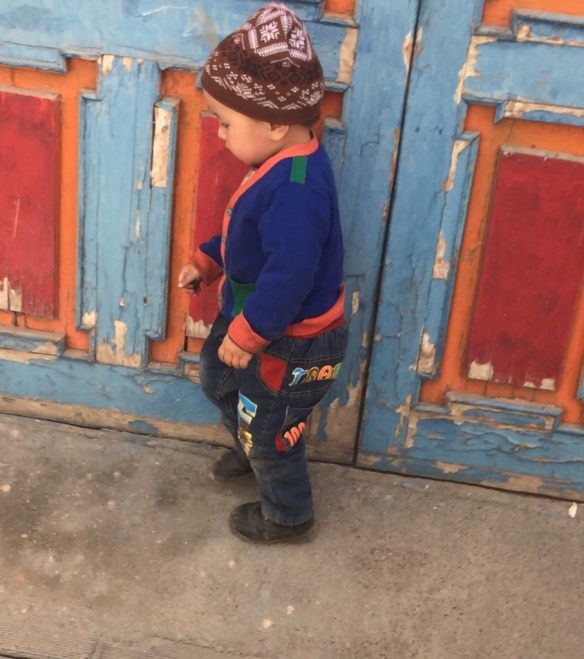
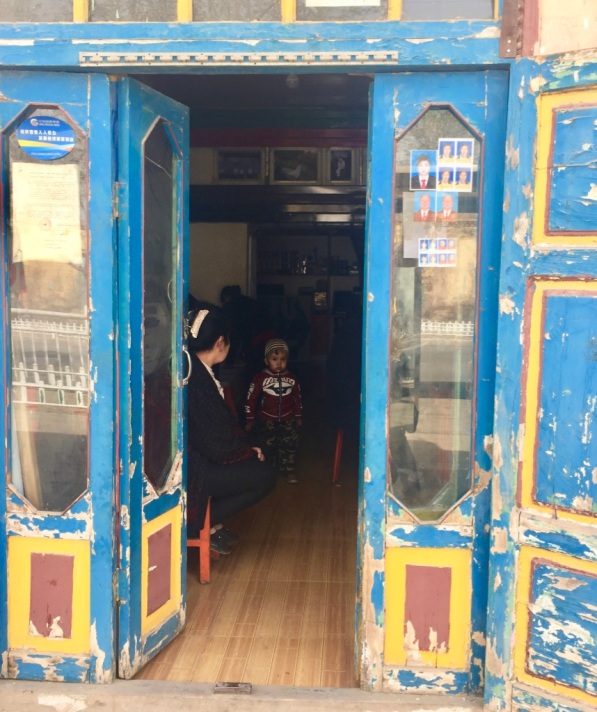
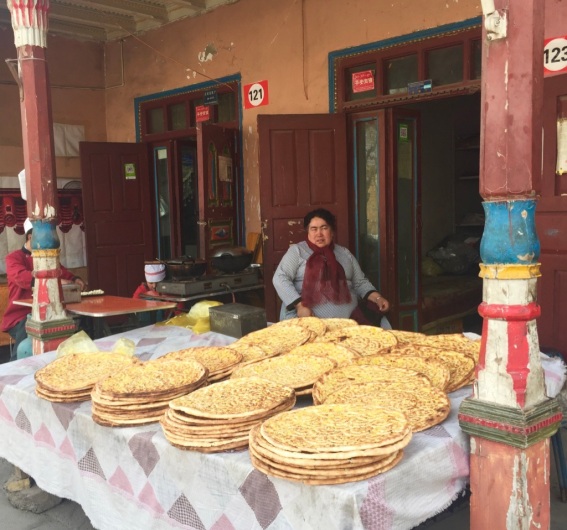
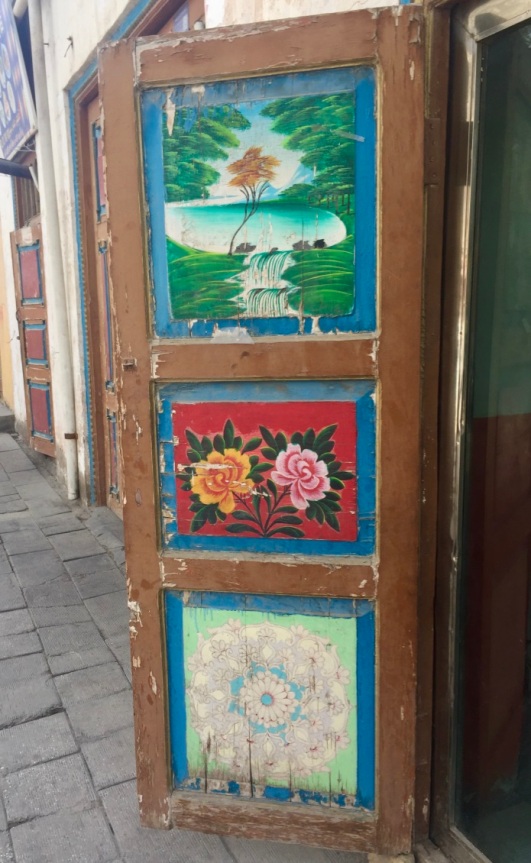
But round the corner here comes Akbar, looking somewhat flustered.
A: We will go back to the hotel now. You are not allowed to go out at night.
Methinks: Wait, what?
Fortunately I am so full from lunch I can’t face dinner, and I have plenty of time to try and figure out what’s going on. Its about 8 o’clock when it finally dawns on me.
Act 2: A nice day out
As anticipated, any pretense of a client relationship has evaporated come the morning and Akbar seems to have reverted to his normal personality, which is rather morose. We bump into each other at least an hour before the agreed-on time.
A: Let’s go.
Me: OK (I turn to Akbar’s friend) What’s your name? (He thinks for a minute)
AF: Eshe
E: Can I smoke?
Me: pointing to the no-smoking sign in Chinese on the dashboard: maybe your boss won’t like it.
Any lingering doubts I have are quashed when ‘Eshe’ spends the ride smoking and yelling into the walkie-talkie I now notice also on the dashboard, and we are waved through all the checkpoints (the hapless rookie tries to pull us over gets his head handed to him on a plate). At the final checkpoint we pick up an extra, even more surly, Chinese passenger.
Me: Who is this man?
A: He is a friend. We will take him where he can catch a bus.
The Kizil Thousand Buddha caves are worth the drive. Constructed between the 3rd and 8th century they are the earliest Buddhist caves in China, their style derived from the elusive Gandhar kingdom thought to have been located in the Afghanistan/Pakistan area. They underline the importance of the Silk Road as a conduit for religion and culture as well as commodities. They have been desecrated both by Muslim incursions (the faces are disfigured and the eyes are gouged out) and the reviled German archeologist Le Coq who carted huge chunks of the best stuff to the Berlin museum.
The presence of lapis lazuli in the paintings indicates their Persian influence. The pronounced musculature is in the Ghandaran style – attempting a 3D representation
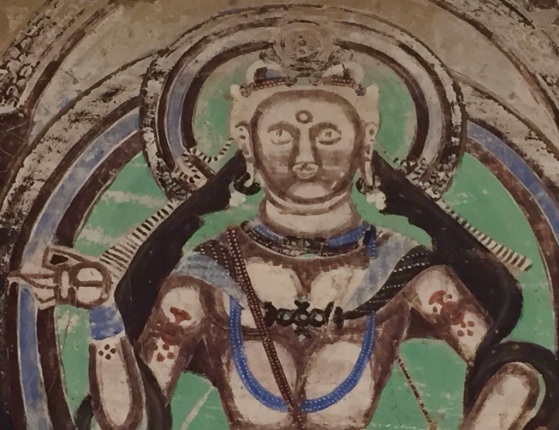
The white dots ‘strings of pearls’ are also Persian. The long earlobes are Indian. In fact these caves have no Chinese influence at all. The one guy is black because he was done in lead and it has oxidized.
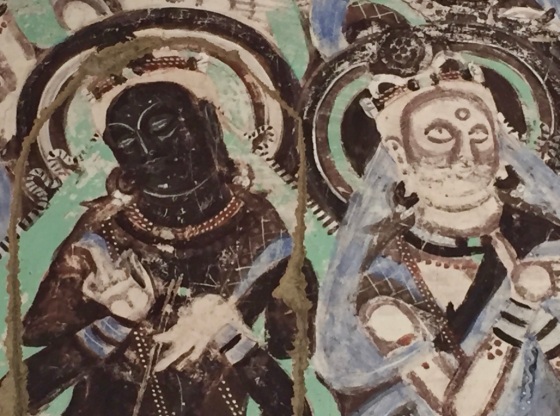
The weather is lovely, the setting is gorgeous and I am the only visitor. I set off for a long walk determined that Akbar, ‘Eshe’ and ‘friend’ stew in their fuggy car for as long as possible.
A beautiful day at the caves
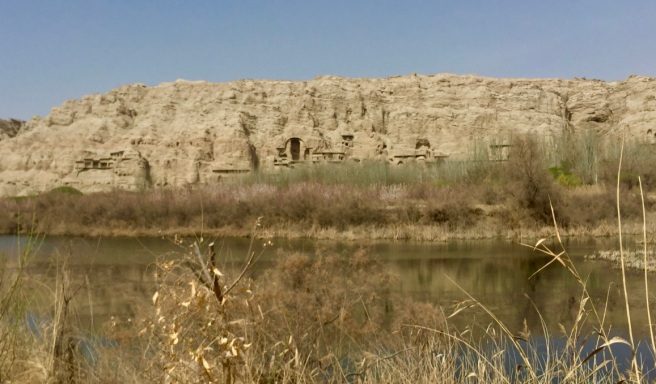 About an hour into it a golf cart hies into my peripheral vision. Scooting off onto an inaccessible walking trail buys me about 5 minutes.
About an hour into it a golf cart hies into my peripheral vision. Scooting off onto an inaccessible walking trail buys me about 5 minutes.
Policeman in golf cart: Oi!
Me: Yes can I help you?
PIG: What you doing?
Me: Walking
PIG: Can’t walk here
Me: But I am walking here, I’m walking on this walking trail
PIG: Come with me
Me: No its OK, I’ll see you over there (pointing into the distance).
He shadows me slowly all the way back.
Me: OK I’m done Akbar, what happened, your friend missed his bus?
The ‘friend’ who is still with us looks confused.
At the hotel I hand over 350Y. Now its Akbar’s turn to look confused. He picks it up between finger and thumb and drops it on the dashboard. He does not, however, return it.
Me: Thanks Akbar, that was a nice day out. I’ll see you tomorrow!
They blanch, and I realize with some satisfaction that ‘the day after tomorrow’ has been lost in drunken translation.
In the morning ‘Eshe’ is skulking behind the palm plants when I go to eat breakfast, when I come back from a short foray into the town center and when I sit in the lobby for a couple of hours before leaving to catch the train. I make sure to catch his eye and wave as I leave.
Act 3: In which all is explained
My SWAT team friends at the station are delighted to see me again and to have a chance to retake my photo. But wait! A new pair of glasses plus cell phone appears over the counter.
Me: (somewhat rashly out loud) And why not? Everyone else in Kuqe has my picture on their cell phones.
And then with a smile and in impeccable English
POG: And if you’ll come this way, I’ll explain why.
Let’s call him Timmy is a milenial American literature graduate from the University of Shanghai whose mother has forced him to join the Railway Police because of the steady salary and good benefits. But he has been seconded to that first circle of hell, Kuqe. He has also been seconded to baby sit me until such time that the train comes and I get on it.
Timmy is a great conversationalist and it seems rather indiscreet. Evidently legitimate terror that I may be a journalist in (poor) disguise – the first time my demographic has worked against me and BTW thanks a bunch New York Times – has persuaded Kuqe security services to monitor my every move in 5 minute increments, less if you consider Akbar’s assiduousness. How can handle they that much data I wonder. ‘ You’d be surprised’ Timmy says laconically.
Timmy’s office has comfortable chairs and unlimited phone charging opportunities. We spend an agreeable couple of hours polishing the translation of what seems to be a high level policy document for his upcoming exam and then he pops off on his motorbike to fetch me yogurt, bread and water for the trip. ‘I always feel very vulnerable in that Uighur shop’ he says sadly.
Eventually his boss shows up for some final evaluation. Bye-bye we say to each other with varying degrees of regret (we only have a couple of pages to go in the translation) and the Director of the Station is delegated to usher me aboard. I beg him to ask them to keep the Western toilet open (they like to lock it up and the squats are an awful effort albeit usually surprisingly clean). He obliges and I scarf down the delicious Uighur yogurt, have a nice relaxed pee and sleep like a log.
Akbar communing with the mother ship. ‘Eshe’ puts his hands over his face when I try to take his photo
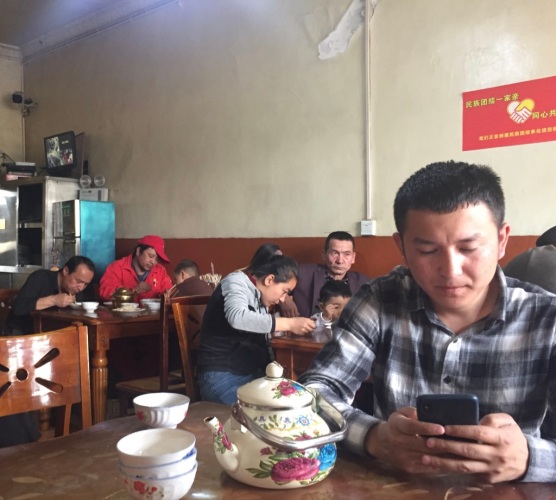
No picture of Timmy with his full body armor and helmet, Steinbeck in his pocket.
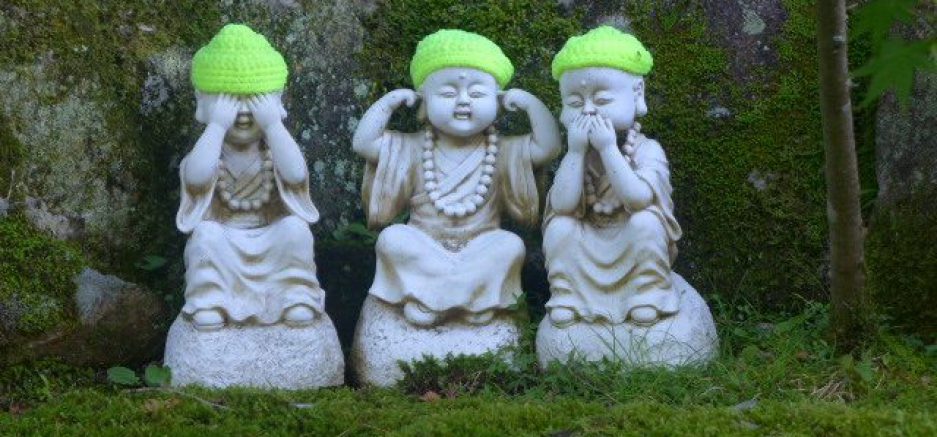
What on earth do you think the yellow gamble poison was meant to be? Travel safe!!
Completely absorbed in your travels
LikeLike
Dear Karin,
I have very much enjoyed reading your erudite articles on travelling through Xinjiang (and on into China) and love the idea of your journey along the old Silk Roads. At times your description of the absurdity of Chinese officialdom reminded me of Theroux’s accounts from years ago. It seems that there are some things in China which do not change.
I toured Xinjiang in 2003 and was beguilled; I had the great fortune in Kashgar (which then had a splendid, albeit shrinking Old City) of meeting some Chinese backpackers (still relatively unusual in those days) who chaperoned me around the province and its unforgettable scenery. I would love to return, but it seems these days that Xinjiang is not much fun (especially for the natives).
All the best in your future travels,
EO
LikeLike
Thanks so much EO! I’ve just spent the last several days riveted by your travels into the corners of Eurasia. Happily still haven’t finished and looking forward to settling down with the rest over the holidays. On my way to Russia for this year’s big trip – I’ve been reading up on Patriotic War and Soviet history. Starting off in Yakutsk though – it feels like the new train may have been extraordinarily badly timed given the poor prognosis for permafrost, and it feels important to take a ride on it before it subsides into the muck. After that Ulan Ude and Tomsk with Volgograd a must see down the line. Would be delighted if you have any suggestions, I have 6 weeks and though the train system is my oyster as they say, I am envious of the freedom your trusty vehicles provide!
Best wishes for the New Year
Karina
LikeLike
Hi Karina
I’m very glad to hear you are enjoying my articles. Sounds like an exciting trip you have planned. I’m not sure if you have seen my latest post, but it covers Tomsk and I think it’s an excellent choice of stop. In fact, if I were to recommend only one city to visit in Siberia, it would be Tomsk. It seems you have plenty of time, so I can indeed recommend a good few places on the way.
A nice trip out of Yakutsk is to the Lena Pillars, though I imagine it might be quite pricey. You’ll get to drive a bit on the frozen Lena which is quite an experience.
My next recommendation wouldbe Nerchinsk, around 200 km before Chita. It was where the first treaty between Russia and (Manchu) China was signed, and was also an early stop on the Great Tea Route, a sort of northern Silk Road. It was a place of exile (of course) and later became a gold mining town. Butin, a local magnate, built a fantastic palace in the far flung spot and part of it is a local museum, well worth visiting. See my Stage 43 [2/3].
Next, and still in Zabaikalsky Krai (the territory of which Chita is the capital), there are two Buddhist monasteries (datsany) in the Tibetan / Mongolian style. One is near Aginskoye, and the other in Tsugol. If you have to chose one, make it Tsugol, it is truly magnificent, particularly given how narrow its chances were of escaping Stalin’s vandalism. See my Stage 23 [1/2].
Chita is worth a quick visit, there is a museum to the Decembrists who were quite crucial in making Siberia what it is today.
Ulan-Ude makes a nice stop; in my opinion slightly nicer, though a little less interesting than Irkutsk. Lake Baikal is the real attraction, and I loved the Barguzin Valley even more. See also 23 [1/2]. Ivolginsky Datsan is nice, though architecturally bland compared to Tsugol.
I’ve never really been to Krasnoyarsk, but south of here are the republics of Khakassia and Tuva, the latter being perhaps my favourite place in all of Russia. There are no trains unfortunately. Similarly the Altai Republic, south of Novosibirsk, simply magnificent scenery. See my Stage 1 [1/2] and 43 [2/3].
Omsk is missable, as is Tyumen, and even Yekaterinburg is only of passing interest. North of Yekaterinburg is perhaps my favourite small town in Russia; Verkhoturye, though it may not be as nice in winter. Another great place round there is the little town of Irbit; this once had one of Russia’s largest trade fairs (along with Makaryev (Nizhny Novgorod) and Moscow) and was an integral part of the Great Tea Route. There’s a nice museum there and it’s a nice example of a small town slowly fading into provinciality, rather like Nerchinsk but less ‘out there’. See my Stage 43 [1/3].
I’ve always liked Samara, it’s a gritty industrial city, but a great place to see the Volga and in 2010 had a great city centre with lots of old architecture. Tolyatti, the Soviet Detroit, is mildly interesting and very Soviet.
I really like the cities on the Volga, even gritty Ulyanovsk where V.I. Ulyanov hailed from. Saratov is pleasantly mediocre. It was once the capital of a Soviet Volga German Republic, whichof course was disbanded during the war. Volgograd, specifically Mamyev Kurgan, is a must-see of course, and the nearby Kalmykia Republic is very unusual for being a Buddhist, Mongolian part of Europe. See my Stage 21.
South of there, the Caucasus are magnificent, but not sure of you have time to go. They are covered in my Stage 20 (both parts).
All the best for the New Year, don’t hesitate to contact me for more info,
EO
LikeLike